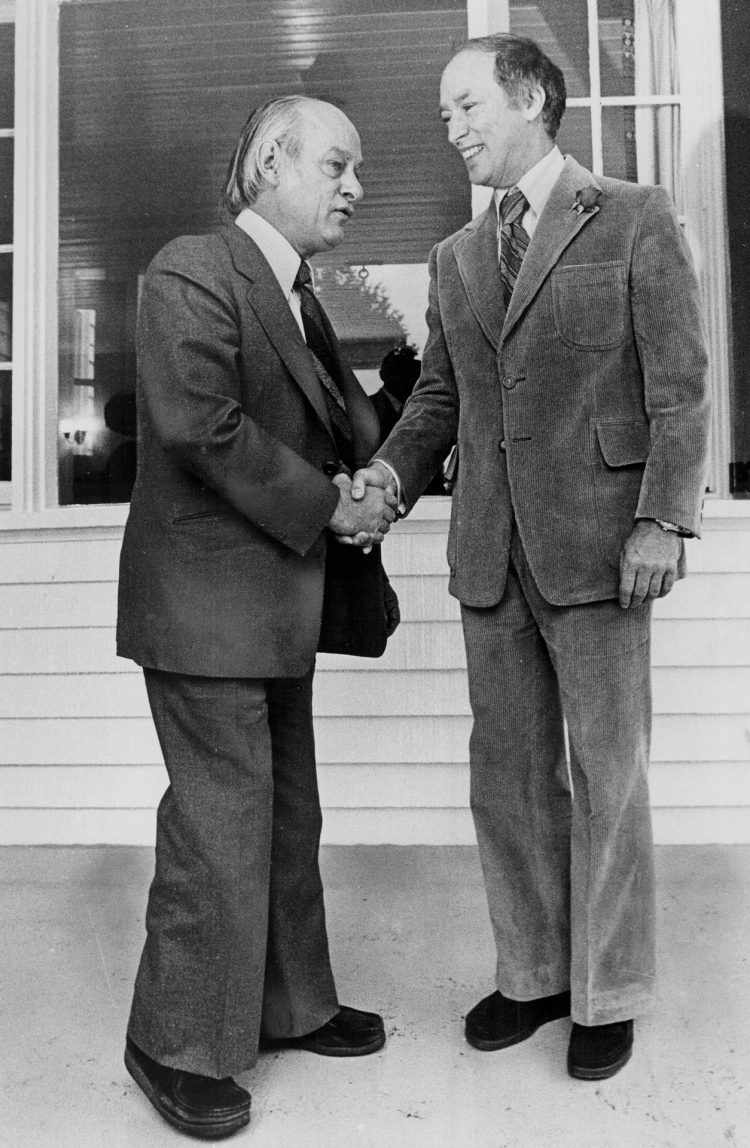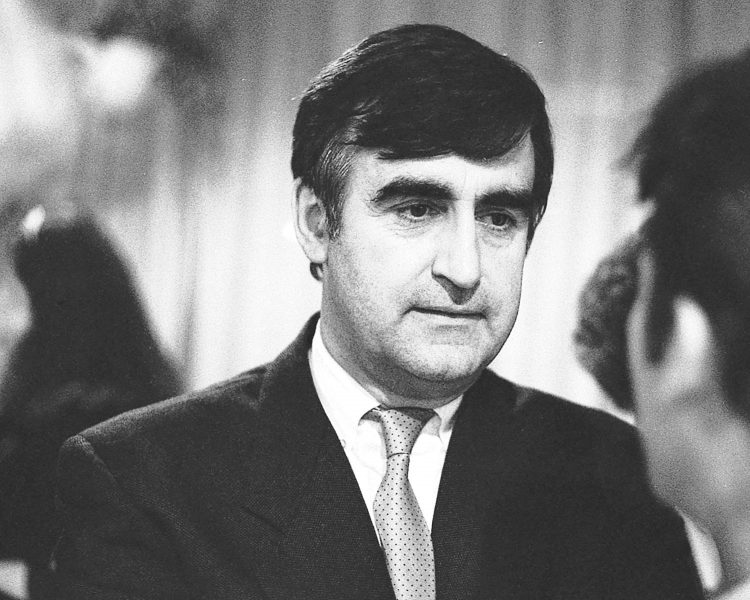A Year of Unity Milestones Remembered
In a year when Canadians, including their frequently quarrelsome governments, have united against the existential threat of a pandemic, the country may be distracted from three crucial anniversaries. Graham Fraser, who spent years as a journalist explaining Quebec politics to the rest of Canada and a decade as Commissioner of Official Languages, reminds us of three moments when history might have pivoted to a different outcome.
Graham Fraser
This is a year for national unity anniversaries: 25 years since the 1995 Quebec referendum, 40 years since the 1980 referendum, and 50 since the October Crisis. Each milestone marked the country’s historical consciousness; each one occurred in a context that now seems as distant as the Second World War.
The October Crisis, provoked by the kidnapping of Montreal-based British Trade Commissioner James Cross by the Front de libération du Québec (FLQ) and escalated by the murder of Quebec cabinet minister Pierre Laporte, led to the War Measures Act, the suspension of civil liberties and the imprisonment of over 400 people who were never charged. I was in Italy during the October Crisis, and watched grainy television clips of Vietnamese students being loaded into paddy wagons—a frightening giveaway that the police were rounding up people who had nothing to do with the FLQ.
Except for a few minor incidents, the October Crisis marked the end of seven years of terrorist bombings in Quebec. But it also led to overreach by the Royal Canadian Mounted Police (RCMP). The burning of a barn to pre-empt a rumoured meeting of the FLQ and the Black Panthers and a break-in to steal membership lists of the Parti Québécois (PQ) resulted in the McDonald Commission inquiry and the creation of the national spy agency, the Canadian Security and Intelligence Service (CSIS).
Rather than eliminating the Quebec independence movement, the federal excesses had the effect of strengthening it; a number of PQ cabinet ministers in the Lévesque government would date their commitment to Quebec independence to the October Crisis and the federal response. Ten years later, PQ leader René Lévesque was premier of Quebec, determined to fulfill his promise to hold a referendum on sovereignty-association. Three-and-a-half years into his mandate, despite realizing he would not win, he kept his commitment and held a vote; 60 percent voted No and 40 percent voted Yes. The night of the vote was poignant; hoarse and exhausted, all but alone on stage, Lévesque said, almost plaintively, “À la prochaine fois”—until the next time.
Holding a referendum was not a risk-free proposition. Losing one, as it turned out, involved losing powers for Quebec. Pierre Trudeau had vowed that if the Yes side were defeated, he would take it as a mandate to change the Constitution. Quebec nationalists interpreted this as a promise to give more powers to Quebec. When the ultimate result—a Charter of Rights and Freedoms—was enacted without Quebec’s support, there was a bitter sense of betrayal that still lingers, and helped drive support for the federal, antifederalist Bloc Québécois party.

The bitterness created by Quebec’s exclusion led to the defeat of the federal Liberals and the dramatic victory of Brian Mulroney in 1984, fuelled by his promise to bring Quebec into the constitution. The failure of the Meech Lake Accord in 1990 contributed to the return of the PQ, led by Jacques Parizeau, determined to succeed where Lévesque had not. In the spring of 1995, Parizeau had yielded to pressure for a softer referendum question from Lucien Bouchard, who had bolted from Mulroney’s cabinet in 1990 over the handling of Meech Lake and formed the Bloc Québécois. When the beginning of the campaign went badly and it looked as if the result would be a repeat of 1980, Parizeau named Bouchard chief negotiator and gave him a leading role in the campaign. I was in Washington, and came back three times to cover the referendum campaign: each time, the situation looked very different.
Bouchard acquired almost mythic status in Quebec, having nearly died a few months earlier from a flesh-eating infection that resulted in the amputation of his leg. Limping to the stage night after night, obviously in pain, he poured out his rage and resentment at what he conveyed as the humiliation of Quebec by Trudeau’s so-called betrayal.
Referendum night, October 30 1995, was tense. The Yes vote had surged into an early lead with the votes from eastern Quebec; the No vote gradually inched back, only pulling ahead with the votes from Montreal and the Outaouais. The final result was a razor-thin victory for the No: a margin of 54,000 votes out of 4.6 million votes cast; 50.6 percent voted No, and 49.4 percent voted Yes.
If the 1980 referendum night was marked by poignancy and sadness, the 1995 post-mortem was stained by anger and bitterness. Angry Yes voters surrounded the No headquarters, blocking people from leaving; there were bonfires and angry demonstrators on rue De Maisonneuve in Montreal. Deputy Premier Bernard Landry vented his fury at an immigrant hotel worker, and Jacques Parizeau shocked even his supporters by infamously blaming “money and the ethnic vote.” The next day, Parizeau resigned. Within weeks, Bouchard was swept into the premier’s office. And the result further weakened Quebec: The Supreme Court decided the terms under which Quebec could separate.
So, what happened? How is it that a movement that was on the brink of triumph 25 years ago has dissipated and fractured?

Part of the reason was the sheer, exhausting intensity of the 1995 referendum itself. As people recovered, no-one but the most strongly committed wanted to relive the trauma they had just endured. In a few years, the sovereignty movement was, in Parizeau’s phrase, a field of ruins.
One reason was the Supreme Court decision in 1998 on the Quebec reference, which described four unwritten principles of the constitution—federalism, democracy, constitutionalism and the rule of law, and the protection of minorities—and laid out the conditions that would require the federal government to negotiate: a clear answer to a clear question. Claimed as a victory by both Ottawa and Quebec City, the Supreme Court reference made it clear that a referendum vote would not be, as Bouchard had claimed, a magic wand. It be-came equally clear that the 49.4 percent vote was not a permanent block of support for sovereignty.
Another factor was the lack of a unifying sense of mission. Lévesque had the gift of convincing conservative nationalists and socialists, hardliners and moderates, that he really favoured their position and only tolerated the others. This fiction blew apart, and none of his successors was able to pull together all of the nationalist factions into a common front. The sovereignty movement suffered an existential crisis in 2007 when the Parti Québécois finished third, and Quebec nationalism began to turn inward. Until then, many sovereignists believed they were still only 54,000 votes from independence.
Quebec’s grievances against Ottawa became more and more technocratic. As the late Washington guru of realpolitik—and, as a McGill University alumnus, former Quebec resident—Zbigniew Brzezinski once observed, countries don’t break up over who has jurisdiction over manpower training. There was a flicker of hope among indépendantistes when Stephen Harper was elected, the first prime minister from Western Canada since John Diefenbaker to win a majority—in 2011 after two minority governments. But Harper took pains to speak French first in every public declaration he made, everywhere in Canada and around the world. And he was equally disciplined in respecting provincial jurisdiction.
The political crises that have taken place in Quebec over the last few years—corruption in the construction industry revealed by the Charbonneau Commission, the massive carré rouge protests that shut down French-language universities in Quebec in 2014—were squarely in provincial jurisdiction. There was no federal bad guy to blame. And when there was, with the sponsorship scandal, the surge in support for the Bloc Québécois was only temporary. More recently, the Brexit debacle in the not-so-United Kingdom has been a graphic indication that extracting oneself from a political entity—as a sovereign country, let alone a province—is fraught with problems.
But more than that, an underlying shift has occurred. Francophones are no longer at an economic disadvantage in Quebec. In fact, Francophones in Quebec earn more than Anglophones. French has not withered in Quebec, it has thrived. Support for federalism has increased during the COVID crisis. Montreal welcomes immigrants, even if the rest of the province is uneasy about them, and while the metropolis is underrepresented in the National Assembly, its diversity is changing Quebec. In a sign of the changed times, Quebec Premier François Legault, a former PQ minister who leads a party that proudly calls itself a coalition (Coalition Avenir Québec), recently asked the federal government to send the army into long-term care facilities that had been overwhelmed by the COVID-19 pandemic—almost half a century after troops patrolled the streets in October 1970, and in a move that would have been unthinkable until now for any previous premier.
When he was an advisor to Prime Minister Mulroney, the late Marcel Côté gave me an interesting insight. He argued that some 25 percent of Quebecers want Quebec to be part of Canada under any conditions; 25 percent want Quebec to be part of Canada provided it is treated with respect as a senior partner in the federation; 25 percent want Quebec to be independent provided there is no cost, and 25 percent want Quebec to be independent whatever the cost. Those numbers have fluctuated over the years, but the insight remains valid. When Quebecers have felt insulted or humiliated by Ottawa or the rest of Canada, as was the case when the Meech Lake Accord died, support for independence has soared. When Quebecers feel that the federal system works—as it generally has during the COVID crisis—that support wanes.
But no-one should imagine that the appeal of sovereignty will ever disappear entirely. All it could take is a generation that didn’t live through the trauma, feels excluded, and embraces the romance of the beau rêve.
Contributing Writer Graham Fraser covered the 1980 referendum for The Gazette and the 1995 referendum for The Globe and Mail. He is the author of René Lévesque and the Parti Québécois in Power, and Sorry, I Don’t Speak French: Confronting the Canadian crisis That Won’t Go Away. He served as Canada’s Commissioner of Official Languages from 2006-16.
